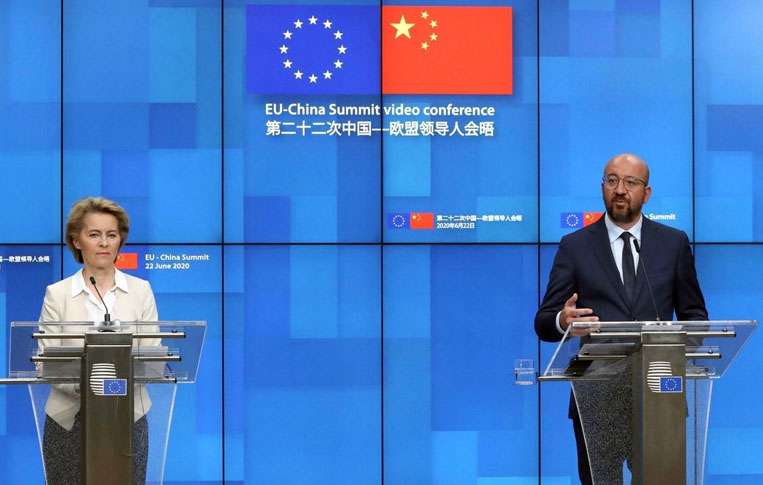
(TibetanReview.net, Jun24’20) – The European Union and China held their 22nd bilateral Summit via videoconference on Jun 22 amid suggestions that it concluded with more differences than consensus and the issue of human rights, including the situation in Tibet, being also taken up with Beijing.
The EU said it raised its concerns on the deteriorating human rights situation, including the treatment of minorities in Xinjiang and Tibet, and of human rights defenders, as well as restrictions on fundamental freedoms.
It also spoke of having underlined its expectation that the Human Rights Dialogue will take place in China later in the year once the Covid-19 restrictions were eased.
EU Leaders were also stated to have raised a number of individual cases, including the reports on citizens who had disappeared after reporting/expressing their views on the handling of the Coronavirus outbreak, as well as the continued arbitrary detention of Swedish citizen Gui Minhai and two Canadian citizens – Michael Kovrig and Michael Spavor.
On Hong Kong, the EU said it reiterated its grave concerns at steps taken by China to impose national security legislation from Beijing and considered those steps not in conformity with the Hong Kong Basic Law and China’s international commitments, and put pressure on the fundamental rights and freedoms of the population protected by the law and the independent justice system.
China’s party mouthpiece globaltimes.cn Jun 23 cited Chinese observers on EU affairs as pointing out that the “EU defending their so-called values by bringing up a number of issues such as Hong Kong, Xinjiang and human rights could be interpreted as building a ‘spiritual fortress’ in the face of China’s growing influence.”
It acknowledged that “the EU also raised some concerns over human rights issues in Xinjiang and Tibet, in addition to questions about China’s epidemic response and the prosecution of Canadians Michael Kovrig and Michael Spavor.”
And it “advised” the EU to refrain from ‘politically correction’ values for China ties, suggesting, perhaps, that the meeting did not go down too well for the Chinese side.
China and the EU both say they want to strengthen ties, but the relationship is tangled in a thicket of disagreements on topics ranging from trade and investment rules to human rights and national security, noted an AFP report Jun 23
It said the Jun 22 talks did not produce an agreement – nor even a joint statement – while a senior EU official was cited as saying some high-level political impetus was needed to break the deadlock.
Noting that “our economic dependency is high,” European Council President Charles Michel has said, “Engaging and cooperating with China is both an opportunity and necessity. But, at the same time, we have to recognise that we do not share the same values, political systems, or approach to multilateralism. We will engage in a clear-eyed and confident way, robustly defending EU interests and standing firm on our values.”
And EU President Ursula von der Leyen has said: “The Covid-pandemic and a number of major bilateral and multilateral challenges show clearly the EU-China partnership is crucial, be it in terms of trade, climate, technology, and the defence of multilateralism. But for our relations to develop further, they must become more rules-based and reciprocal, in order to achieve a real level playing-field.”
Charles Michel and Ursula von der Leyen were accompanied by EU High Representative Josep Borrell, while China was represented by Prime Minister Li Keqiang, with President Xi Jinping taking part in exchanges later on.





